“I just don’t understand this math homework,” my bewildered friend texted me late one night at the beginning of the school year. His oldest had just started kindergarten, and yes, he already had homework. Homework that was perplexing to even his bright, 30-something-year-old parents.
Kindergarten has changed in the last decade, and not everyone is happy about it. Today, pre-kindergarten prep is not just a bonus—it’s expected. Students are expected to learn how to read during their kindergarten year, and standardized testing has become, well, standard. Unstructured free-play and “center time” in the classroom may very well be on the way out.
Valerie Strauss from the Washington Post stated,
“Five- and 6-year-old kids now spend hours in their seats doing academic work, often with little or no recess or physical education, or arts, music and science. These kids are tested ad nauseam and expected to be able to do things by the time they leave kindergarten that some, perhaps even many, are not developmentally prepared to do.”
So what does all of this mean for your child?
Pre-K Is More Important Than Ever in Northern Virginia
An excellent Pre-K program can set a strong foundation for your child’s kindergarten success. Look for programs that make kindergarten-readiness their top priority, as well as providing ample opportunity for socialization and free-play.
“Young children’s first experiences in school are quite different today than they were in the late nineties,” said researcher Daphna Bassok. “These changes likely have important implications for children’s learning trajectories.” Getting your children started early in Pre-K will give them the school experience they may need for future success.
It Doesn’t Have to be “Either Or”
There is a place for both academics and unstructured-play in today’s kindergarten classrooms. Professor of early childhood education Lilian G. Kats stated, “The traditional debates in the field about whether to emphasize so-called free play or formal beginning academic instruction are not the only two options for the early childhood curriculum. Certainly, some proportions of time can be given to both of those kinds of curriculum components. But in the early years, another major component of education, (indeed for all age groups), must be to provide a wide range of experiences, opportunities, resources and contexts that will provoke, stimulate, and support children’s innate intellectual dispositions.”
There is a place for both academics and unstructured play in today’s kindergarten classrooms.
Parents Are Still in the Driver’s Seat
Every child is different, and kindergarten should be a place that appreciates and nurtures different learning styles. If your child’s school doesn’t meet their needs, don’t be afraid to look elsewhere. You, the parent, know your children best. If your child’s kindergarten experience feels like it’s spinning out of control, allow yourself to feel empowered to pull back and make some changes.
Virginia Academy Lets Kids Be Kids
At Virginia Academy, we pride ourselves on a rigorous academic program, but there is still a balance between traditional learning and unstructured play. Elementary grades blend a solid academic foundation with the ideas of Christian citizenship and biblical values. Curriculum is taught through a variety of methods that allow students to actively approach each subject.
Questions to ask when considering a school:
- What sets your school’s kindergarten program apart?
- How does your school incorporate free-play into the kindergarten day?
- How much time is spent on free-play on a typical day?
- Does your school utilize outdoor play/recess and/or classroom space?
Nurture Your Kindergartener’s Intellect at Home
- Read, read, read! Read out loud with your child every day, and encourage independent “reading.” (Even if that just means flipping through books and looking for familiar letters, shapes, colors, and sight words.)
- Practice writing the alphabet, including upper and lowercase letters.
- Play! Giving your child ample time to play outside, independently, and with other children is the best thing you can do for their growing minds.
Concerned about Milestones?
It’s important to remember that every child is different, and there is a huge range of what’s considered “normal” when it comes to children hitting their physical and intellectual milestones. Talk to your child’s pediatrician if you have any concerns at all regarding development; they will be able to help, and likely put your mind at ease. At Virginia Academy, it is our firm belief that every child is endowed with unique gifts, talents, and abilities. Our job is to discover and develop them.em.
Want to learn more about kindergarten at Virginia Academy? Get started here.



